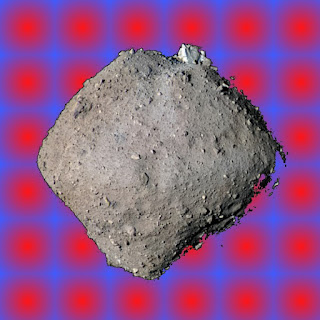Chemical Evolution and Asteroid Question
Japan launched a peregrine falcon into space in 2014. That is what hayabusa means in Japanese, and JAXA took a notion to send Hayabusa2 out to an asteroid named Ryugu. Hayabusa2 sent landers down to the asteroid, and some were successful. After returning to the probe, samples were returned to Earth. Some of the material was shared with NASA, who in return expects to share samples from their own study of asteroid Bennu in 2023. Hayabusa2 will continue its mission.
Space exploration is fascinating. Too bad it seems to be driven by a desire to uphold evolution and pretend that God does not exist.
 |
| Ryugu asteroid, Flickr / JAXA / Kevin M. Gill (background changed) (CC BY 2.0) |
Despite the lies of misotheists, abiogenesis has a great deal to do with evolution. Indeed, another name for it is chemical evolution. A great deal of time and money are spent on getting life from non-life, which would support foolish notions that the Creator does not exist. Ryugu had amino acids, which are considered building blocks of life. This raises the question: Can life come to Earth from way out yonder? Let's see.
Stephen R. from the USA wrote to ask for our comment on the recent amino acid discovery in the samples brought back from the asteroid, Ryugu.Scientists have taken samples from the Ryugu Asteroid and recently found amino acids in the asteroid. I didn’t see anything about proteins found in it or anything greater but this will be notable for the naturalists claiming panspermia or abiogenesis.I wanted to bring this to your attention so it could be addressed. How could those amino acids have formed and how does this affect the case for naturalism and panspermia?Dear Stephen,Thank you for your email.The analysis of the Ryugu samples is exciting because the Hayabusa2 mission is the second ever space probe to collect a sample from an asteroid and deliver it back to earth.
The rest of the answer has somewhat technical biology concepts and is not short, but worth reading. To do so, probe this link: "Asteroid evidence for life on earth coming from outer space?" Also of interest is "Did life’s building blocks come from outer space?"